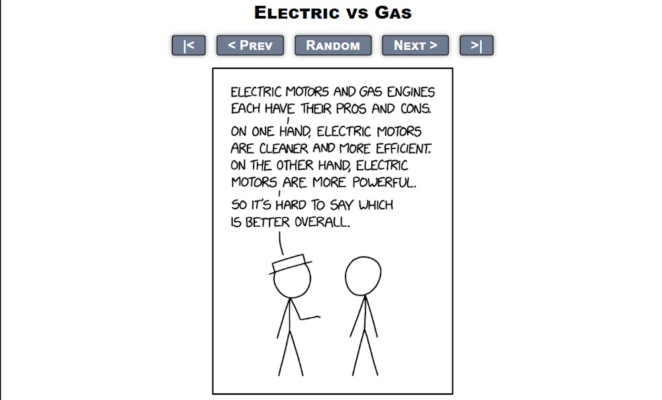Unpacking some EV misconceptions

Yesterday, I made the mistake of clicking on an xkcd Facebook post and reading some of the comments. Today, you get to pay for my indiscretion 😛.
My favorite was the guy who claimed that the 100% factually accurate statements about EVs are somehow political. Um, sorry, John. Facts don’t care about your feelings ;). EVs are better in every way, except winning the hearts/minds of people who are bad at physics and math. In the list of Pro/Con there is really only one tangible “con” to owning EVs. It’s mildly inconvenient to drive long distances because the infrastructure isn’t 100% there, yet. We’re not going to cover that now, because I already did it. That’s a fairly simple math problem.
What we’re going to talk about is the seemingly well-thought out post by Michael Siebold. We’re going to do that because Michael claims expertise, hits a few of the common misinformed talking-points, and displays a subversive level of ignorance that is quite common in these kinds of posts. I don’t know if that ignorance is the willful kind, or just the normal kind, but it’s problematic because it seems like a solid argument, until you start picking at the layers.
Michael Siebold
Think of it as an energy problem. The world turns on energy. How much energy do you suppose is stored in all the gas and diesel station underground tanks in the US at this moment? That energy (+- efficiency factors of internal combustion engines vs electric motors) will have to be sourced somehow if we transition away from combustion based engines. We already struggle to source electrical energy through the grid at peak usage times. We cannot reasonably expect to be transitioning our grid to cleaner energy sources while simultaneously adding the burden of sourcing the energy that is now stored in the underground tanks of all the quick-picks in the nation.It is undeniable that we need cleaner sources of transportation. It is undeniable that we need cleaner sources of grid power. It is unreasonable to attempt to transition both simultaneously.
Ultimately, electric motors merely kick the can down the road. The energy generated to source the charge of the battery must be cleaner for real good to have been done. Otherwise this is similar to sending all our garbage to huge landfills. We simply concentrate the pollution to the areas close to the dirtier sources of power.
Of course these problems can both be solved by accepting nuclear power, but the general public seems to resist that move.
This whole argument ignores the rare earth metal issue in the batteries, the expense of the replacement batteries, and additional vulnerabilities to moisture/flooding that electric vehicles are subject to.
Before the keyboard warriors attack me, I am a Ph. D. Electrical Engineer. Do not misunderstand me, we need to be working on electric and other lower emission vehicles.
What I’m saying is that we do a major disservice to science and the public’s trust in scientists when we oversimplify an issue to the point of trivializing it. That’s when politicians start writing laws inspired by comic strip science rather than realistic projections.
Let’s start at the back.
I suspect that Michael brings his credentials into the discussion to shut down criticism in a “I’m smarter than you” kind of way. That’s weird to me because if you’re right, you’re right. Let the facts speak for themselves. By doing that however, it makes exploring the credentials of the person interesting, and potentially useful, because it’s a fairly easy thing to fact check.
We can start at Murray State University, where Michael claims to work. Hmm, that’s odd, looks like Michael is a visiting assistant professor, but in the math department, not electrical engineering.
Let’s go see what his Ph. D. is actually for. Hmm… even odder, looks like it’s in Mechanical Engineering, with a focus on surgical robots. That’s very cool, but also not Electrical Engineering (EE). Not that it really matters, even if the degree was in EE, Ph. D. are super niche. So being an expert in one aspect of EE doesn’t necessarily make one an expert in everything having to do with energy or energy delivery.
To be clear, I’m not saying Michael is wrong because they appear to have misrepresented their credentials. I’m saying that it’s interesting that Michael signaled expertise that they don’t appear to have to shut down criticism. That says something… If nothing more, it provides a clue about their level of honesty. Now let’s get to why Michael is wrong by picking at the assertions that were made.
Let’s give Michael some credit, this is partially an energy problem. The world does turn on energy. But where they go off the rails is framing it in the context of all the stored dinosaur juice spread around the country.
How did that juice get there? How much energy did it take to extract it from the ground, refine it, and then transport it to all the “quick-picks” in the nation? The answer is a lot, and it needs to happen all day, every day.
Now think about how much energy it takes to move electricity from the utility to your home. Even the mechanical engineers have to acknowledge that it’s an order of magnitude more efficient to run electricity down big wires than to drive gasoline from the refinery to gas stations throughout the country.
It’s also significantly more efficient to operate an EV (~87-91%) than an ICE (~20%) vehicle. So framing it as anything close to 1:1 is deeply problematic.
OK, so what about the carbon (and associated costs). Making EVs is more carbon intensive than making ICE cars. This is completely true. But it’s also true that even when you power your EV with coal, over the life of the car it’s significantly cleaner to operate the EV than an ICE car. If you live in a place that uses renewables, nuclear, or even natural gas that crossover happens way sooner.
It is true that we need to expand the grid to deal with an EV future. What isn’t true is that the grid can’t handle the current load. As the number of EVs expands – mind you this is happening slowly – we can expand the grid as well. There is a relationship between supply and demand there. Even if every new car that is sold starting today was an EV, the total percentage of EVs in the market is tiny compared to the number of ICE cars out there. This transition isn’t happening overnight, it’s happening at a snails pace. We do need to do better with the grid, transitioning to EVs provides an incentive for energy suppliers and grid operators to do better. We should celebrate that. It’s not going to happen if there’s no demand.
In the areas where the grid is under duress, it’s generally only during very specific times of the day. Time-of-use pricing is a great solution to that problem. Most people can happily charge their EV overnight, when demand is generally very low. Price the power in a way that makes the right answer.
Also, in places where we’re throwing away renewable generated electricity, plugging in more EVs during that “duck-curve” time could capture that wasted energy and put it to good use. Although, my preferred approach to solving that problem is localized energy storage.
Now let’s talk about the “rare earth” metals topic that Michael raised. I must admit that I’m not exactly sure where they’re taking this one. Rare earth minerals, aren’t actually rare, they’re just kind of hard to get to, but once you extract them from the ground they exist in the same quantity in the battery as outside and can be recycled 🤯. Also, where does Micheal think petroleum comes from?
This topic is often a lead-in to the concerns around cobalt mining. These are real concerns. As a society we should do more to ensure that people are treated humanely in our supply chains. Whether that’s folks working the mines, or building iPhones. We should do better. What I don’t understand is why cobalt miners are a concern, but oil workers working in equally terrible conditions and fostering despotic regimes isn’t. We’ve been “OK” with one of these things for longer than I’ve been alive, and I’m not young anymore.
Also, the whole batteries will need frequent replacing thing, isn’t true about modern EV with modern battery management systems (BMS) and proper cooling. The early issues with batteries (cough, Nissan) was mostly an artifact of poor cooling and lazy BMS. There’s even a million mile battery in the works, and with far fewer parts EVs are easier/cheaper to maintain. With some speculating that 1,000,000 mile lifespans will become the norm.
The moisture thing, I don’t get at all. Modern cars, all modern cars, are essentially a bunch of computers connected on a series of networks, with wires. An event that floods/ruins an EV, is going to flood/ruin an ICE car too. The batteries are sealed and there’s no combustion, so one might even reasonably argue that EVs are better at water than ICE cars. I don’t have data to support that claim, so it’s just a 🤔.
Sorry Michael, I think your EE Ph. D. has let you down.

Only “Cons” I can come up with is that they are more expensive in general and not a lot of options for people who need to seat more than 5. I am just glad they mostly have the tax incentives now and plan my next upgrade to be an EV for sure!
Seat more than 5!?! That’s a bus, not a car 😜.
Yeah, that’s very much a “developing” area. IIRC, only 2 real options there. The EV9 isn’t terribly priced. With the incentives Kia was putting on the frunk the last time I checked, it was only slightly more expensive than the ICE alternative from Kia.
If you’re shopping for a sedan or crossover, the used EV prices are fantastic right now.
Yeah the EV9 is the one I want for sure. I have considered the Model Y with the extra row but seems pretty cramped back there.
3rd row in the MY is for small dogs or groceries.
😂